The global house price boom continues. House prices in 31 of the 41 world's housing markets which have so far published housing statistics rose during 2014, using inflation-adjusted figures. The more upbeat nominal figures, more familiar to the public, showed house price rises in 32 countries, and declines in only 9 countries.
Ireland is now the world's top performer, with housing prices surging by 16.62% during 2014, a remarkable acceleration from the increase of 6.18% in 2013. In all, seventeen European markets saw house prices rise more during 2014 than the previous year, and only five showed weaker performance.
However the world is now two-speed. While house prices have continued to rise in the United States, and in Dubai, Australia, New Zealand and Brazil, momentum in almost all of these countries has weakened. Dubai's house prices rose by 12.98% in 2014, the second greatest rise; but its house price rises have rapidly decelerated and may be going into reverse.
Asia has also generally weakened, with Japan and Hong Kong significant exceptions. In fact, China and Singapore's housing markets have already entered a downturn, and are now two of the five weakest markets in our global survey.
Inflation-adjusted figures are used throughout this release, which covers the period till end-2014.
Momentum. 24 housing markets showed stronger upward momentum in 2014, while 17 housing markets showed weaker momentum. Momentum is a measure of the "change in the change"; simply put, if a property market has risen faster this year than last (or fallen less) momentum has increased.

|
| Source: Various series, data descriptions and sources here |
By Region:
- Europe's property markets are surging ahead. Ireland is now the world's fastest-rising property market, with residential prices surging by 16.62% during 2014, after an increase of 6.18% in 2013, fuelled by the fastest-growing economy in the EU. Irish house prices rose by 4.92% q-o-q during the latest quarter.
- Some parts of Europe continue to struggle. Seven of the 22 European housing markets included in our global survey saw house price falls in 2014.
- Asian housing markets are mostly weaker, with two outstanding exceptions. Six of the nine Asian markets for which figures are available were weaker in 2014. In Singapore, house prices fell by 3.85% during 2014, after a decline of 0.9% in 2013. House prices fell by 0.89% q-o-q during the latest quarter. In Beijing, China, the price index of second-hand residential buildings fell by 5.67% during 2014, after spectacular growth of 16.93% the previous year. In Taiwan, house prices rose just 1.26% in 2014, a sharp slowdown after five years of spectacular price rises. In Indonesia, residential prices in the country's 14 largest cities rose by a meagre 0.39% in 2014, down from 2.93% the previous year. In the Philippines, the average price of 3-bedroom condominium units in Makati CBD rose by 4.29% in 2014, decelerating from 9.86% in 2013. In Thailand, housing prices rose by 3.72% during 2014, down from 3.87% the previous year.
- Only three major Asian markets showed stronger performance during 2014
- The US housing market's upward momentum is slowing sharply. The S&P/Case-Shiller seasonally-adjusted national home price index rose by 3.85% during 2014, a sharp slowdown from the rise of 9.1% in 2013. Likewise, FHFA's seasonally-adjusted purchase-only U.S. house price index rose by just 3.65% in 2014, down from 6.39% in 2013. Despite this, US residential construction activity and property transactions continue to rise.
- Dubai's housing market is losing momentum. Dubai's property prices rose by 12.98% in 2014, down from 21.52% in 2013, and 21.64% in 2012. House prices actually dropped 1.14% during the latest quarter. Despite this, Dubai's economy continues to grow at a healthy pace.
- Pacific housing markets continue to rise, but at a slower pace. Australia's housing market is now slowing, with house prices in the country's eight major cities rising by 5.25% in 2014. House prices increased 1.76% q-o-q in Q4 2014. Likewise, New Zealand also slowed, with nationwide median house prices rising by 4.6% during 2014, down from the 8.02% rise in 2013. However, house prices actually rose by 7.34% q-o-q during Q4 2014.
- South Africa's housing prices continue to rise modestly. The country's price index for medium-sized apartments rose by 2.62% during 2014, after a decline of 1.3% in 2013. House prices increased 1.95% q-o-q in Q4 2014.
- Brazil's housing market slowed sharply. During 2014 Sao Paulo's house prices rose by a meagre 0.83%, after almost five years of double-digit house price rises. House prices dropped 0.8% in the latest quarter.
Estonia had substantial rises, with Tallinn's average dwelling prices surging by 12.59% during 2014, after increases of 16.55% in 2013, 1.59% in 2012 and 8.33% in 2011. House prices increased 3.21% q-o-q during the latest quarter.
In Sweden, house prices rose by 8.78% in 2014, after 3.8% in 2013.
In Turkey, house prices rose by 8.05% in 2014, up from 5.73% the previous year.
The UK property market also performed strongly, with the nationwide house prices rising by 7.33% in 2014, a significant increase on 4.88% the previous year.
Other strong European housing markets include Iceland, with house prices rising by 5.18% during 2014, Netherlands (4.12%), Riga, Latvia (3.7%), Lithuania (3.61%) and Norway (3.61%). All of these European countries' prices rose more in 2014 than the previous year. Moreover, all, except Norway, saw positive q-o-q growth in Q4 2014.
European housing markets with modest house price rises included Czech Republic, with house prices rising by 2.26% in 2014, Bulgaria (2.05%), Switzerland (1.8%), Croatia (1.69%), and Slovak Republic (0.25%). All, except Switzerland, performed better in 2014 than the previous year. Bulgaria, Switzerland and Slovak Republic saw positive quarterly growth during the last quarter of 2014.
In Kiev, Ukraine, the average price of new residential properties plummeted by 48.85% in 2014. House prices in the capital fell 9.7% q-o-q in Q4 2014. These sharp house price falls are mainly attributable to the hyperinflation currently being experienced in Ukraine caused by the collapse of the hyvnia, Ukraine's currency.
In Russia, residential property prices fell 6.15% in 2014, after declining 5.86% in 2013. Russian house prices dropped 1.37% q-o-q in Q4 2014. In Greece, house prices fell by 4.34% during 2014, an improvement from a price decline of 8.06% in 2013.
Other European housing markets which saw smaller house price falls included Spain, with house prices down 1.96% during the year to Q3 2014, Finland (-1.88%), Romania (-1.78%) and Portugal (-0.52%). However, only Finland showed weaker performance during 2014 than the previous year.
In Tokyo, Japan, the average price of existing condominium sales surged by 8.34% in 2014, after a rise of 3.91% in 2013. Hong Kong's residential property prices rose 8.03% during 2014, after 3.3% growth the previous year. South Korea's housing purchase price index increased just 0.86% during 2014, after falls of 0.81% in 2013, and 2.77% in 2012.
Canada's housing market continues to gather pace. House prices in the country's eleven major cities rose by 3.47% during 2014, the biggest annual price increases since Q2 2012. House prices increased 0.75% q-o-q in Q4 2014.
In contrast, Israel's house price rises are now accelerating. The nationwide average price of owner-occupied dwellings surged 8.65% during 2014, its biggest rise since 2010. However, the economy is slowing sharply. House prices increased 2.11% q-o-q in Q4 2014.

|
| Source: Various series, data descriptions and sources here |
Europe's property market boom continues
Three of the five strongest housing markets in our global survey are in Europe.
The Irish housing market roared back to life last year, with residential property prices surging by 16.62% during 2014, a remarkable upturn from an increase of 6.18% in 2013 and annual declines of 5.6% in 2012, 18.71% in 2011, 11.65% in 2010, 14.33% in 2009 and 13.28% in 2008. House prices rose strongly by 4.92% q-o-q in Q4 2014.
The Irish economy is now the fastest-growing economy in the EU, with GDP growth of 4.8% last year, after meagre growth of 0.17% in 2013 and a contraction of 0.3% in 2012. The economy is expected to grow by 3.5% this year.
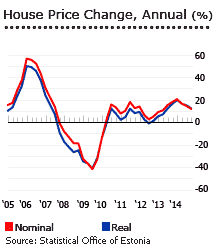
Estonia is the second best performer in Europe and the third best housing market in our global survey. In Tallinn, the average price of dwellings surged by 12.59% during 2014, after price increases of 16.55% in 2013, 1.59% in 2012 and 8.33% in 2011.
The number of purchase-sale contracts of real estate increased 3.6% in 2014, while transaction values were up by 13% over the same period, according to Statistics Estonia. The economy grew by 1.8% last year, after annual growth rates of 1.6% in 2013, 4.7% in 2012, 8.3% in 2011, and 2.5% in 2010, according to the IMF. Economic growth is expected to be 2% this year.
Sweden's house prices rose by 8.78% in 2014 from a year earlier, despite a weak economy, after house price rises of 3.8% in 2013 and 2.28% in 2012. The economy expanded by only 1.8% in 2014, after anaemic growth of 1.6% in 2013 and 0.9% in 2012, according to the European Commission. The Swedish economy is expected to recover in 2015, with growth of 3%.
Turkey's housing market also performed strongly, with house prices rises of 8.05% during 2014, up from 5.73% the previous year. The Turkish economy grew by 3.5% last year, after 4.1% in 2013 and 2.1% in 2012.The economy is projected to grow by 3.5% this year.
The UK property market has continued to strengthen, with nationwide house prices rising by 7.33% in 2014, after an increase of 4.88% in 2013 and declines of 3.67% in 2012 and 3.39% in 2011. The UK economy expanded by 3%, after growth of 1.7% in 2013, 0.3% in 2012 and 1.1% in 2011, according to the British Chambers of Commerce. Economic growth is projected at 2.6% this year.
Other strong European housing markets include Iceland, with house prices rising by 5.18% during 2014, Netherlands (4.12%), Riga, Latvia (3.7%), Lithuania (3.61%) and Norway (3.61%). All of the abovementioned European countries performed better in 2014 than the previous year. All, except Norway, saw positive q-o-q house price growth in Q4 2014.
European housing markets with modest house price rises included Czech Republic, with house prices rising by 2.26% in 2014, Bulgaria (2.05%), Switzerland (1.8%), Croatia (1.69%), and Slovak Republic (0.25%). All, except Switzerland, performed better in 2014 compared to a year earlier. Bulgaria, Switzerland and Slovak Republic saw positive quarterly growth during the last quarter of 2014.
Several European housing markets still struggling
Ukraine is the world's weakest housing market. In Kiev, the average price of new residential properties plummeted by 48.85% in 2014, after annual rises of 0.95% in 2013, 8.53% in 2012, and 5.21% in 2011. Over the past year, the hryvnia lost about three-quarters of its value in relation to the US dollar. Inflation is officially at 28.5%, but some unofficial figures suggest that it is really as high as 272%. In response, the central bank recently raised the benchmark interest rate from 19.5% to 30%.
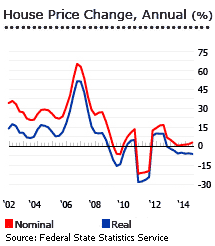
Russia's housing market remains weak, after a serious financial crisis amidst the Ukraine conflict and falling oil prices. Residential property prices dropped 6.15% in 2014, after price falls of 5.86% in 2013, and a rise of 9.74% in 2012. The Russian economy grew by a meagre 0.6% this year, following growth of 1.3% in 2013, 3.4% in 2012 and 4.3% in 2011, according to the Federal Statistics Office.
Greece continues to improve, though it remains the third weakest housing market in our global survey. Greek house prices fell by 4.34%, an improvement after declines of 8.06% in 2013, 13.77% in 2012, 9.17% in 2011, 11.58% in 2010, and 5.97% in 2009. Greek house prices fell only 0.55% during the latest quarter.
Greece's economic growth is expected to pick up to 1.2% this year, after growth of 0.8% in 2014 and a prolonged recession from 2008 to 2013, according to the Hellenic Statistical Authority (ELSTAT).
Other European housing markets which saw minimal house price falls included Spain, with house prices falling by 1.96% during the year to Q3 2014, Finland (-1.88%), Romania (-1.78%) and Portugal (-0.52%). However, only Finland showed weaker performance during 2014 than the previous year.
Asian housing markets slow further
Only three of the nine Asian markets for which figures are available in 2014 performed better than the previous year while the remaining six housing markets performed worse - indicating that Asian countries are now losing momentum.
Singapore's housing market remains depressed, with house prices falling by 3.85% during 2014. House prices fell by 0.89% q-o-q during the latest quarter.
Both demand and supply are falling. The number of private residential units sold plunged more than 50% to 7,316 units in 2014, according to the Urban Redevelopment Authority. On the other hand, the number of private residential units launched also plummeted by about 52% to 7,693 units over the same period. Singapore's economy was estimated to have expanded by 3% last year, from 3.9% in 2013, 2.5% in 2012, and 6% in 2011, according to the IMF.
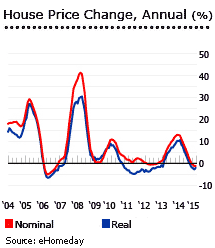
China's once booming property market is slowing dramatically. In Beijing the price index of second-hand residential buildings fell by 5.67% during 2014, contrasting with the spectacular price rises of 16.93% the previous year. But during the latest quarter house prices in Beijing increased by 1.05%.
In an effort to boost the property market, the government recently decided to ease property curbs. The central bank also loosened mortgage restrictions in September 30, 2014, giving homeowners who have paid off their mortgages and want a second property the same advantages as first-time buyers, including a 30% minimum down payment, compared with a minimum of 60% previously imposed. The central bank also cut its key interest rates in November 2014 and reduced reserve requirements for major banks in January 2015.
Taiwan's housing market is now slowing sharply, after government housing market cooling measures. Nationwide house prices increased by just 1.26% in 2014, after dramatic growth of 14.46% in 2013, 7.72% in 2012, 8.2% in 2011, 14.56% in 2010 and 19.15% in 2009. House prices actually dropped 0.25% during Q4 2014.
Residential property transaction volumes across Taiwan fell to a 13-year low of less than 320,000 units in 2014. The country's economy grew by 3.51% in 2014, up from 2.1% in 2013 and 1.5% in 2012, according to the Directorate General of Budget, Accounting and Statistics (DGBAS). Economic growth is projected at 3.4% this year.
In Indonesia, residential prices in the country's 14 largest cities rose by a meagre 0.39% in 2014. Housing prices actually fell by 0.52% q-o-q during the latest quarter. The country's economy grew by 5% last year, a slowdown from 5.8% in 2013, 6.3% in 2012 and 6.5% in 2011, according to the IMF. GDP growth is projected at 5.2% this year.
In the Philippines, the average price of 3-bedroom condominium units in Makati CBD rose by 4.29% in 2014, a sharp deceleration from 9.86% price rises in 2013. Housing prices increased 1.51% q-o-q during Q4 2014.
The number of new residential condominium units sold in Metro Manila fell by 7.1% in 2014. New units launched dropped 33%.
Makati CBD property prices soared by 19.5% from Q1 2011 to Q4 2013, amidst rapid economic growth. The economy expanded by 6.1% in 2014, after real GDP growth rates of 7.2% in 2013 and 6.8% in 2012. The economy is expected to expand by 7%-8% this year.
In Thailand, housing prices rose by 3.72% during 2014, but housing prices dropped 0.27% q-o-q in Q4 2014. Economic growth slowed sharply to 0.7% last year, after annual growth rates of 2.9% in 2013 and 6.5% in 2012.
Two Asian markets significantly higher
Japan's housing market performed strongly in 2014, amidst Prime Minister Shinzo Abe's latest economic stimulus package. In Tokyo, the average price of existing condominiums soared by 8.34% in 2014, after a 3.91% price rise in 2013 and declines of 1.09% in 2012 and 3.53% in 2011. Property prices surged 6.36% q-o-q in Q4 2014. Yet existing condominium sales in the capital city fell by 7.14 to 33,956 units in 2014 from a year earlier, according to The Land Institute of Japan.
After slipping into recession in Q3 2014, the economy is expected to contract by about 0.5% in fiscal 2014 (which will end this March 31, 2015), after growing by 1.5% both in 2012 and 2013.
Likewise, Hong Kong's residential property prices surged by 8.03% during 2014, higher than the previous year's 3.3% growth. Hong Kong's housing market slowed sharply in the first half of 2014 due to government cooling measures. but bounced back quickly in the second half. Housing prices increased 2.38% q-o-q during Q4 2014.
Demand for low-cost apartments has soared in Hong Kong. The total number of homes sold rose by 25.9% in 2014 but sales values fell 45%, according to the Ratings and Valuation Department (RVD). Hong Kong's economy expanded by 2.3% last year, after 2.9% in 2013 and 1.6% in 2012.
In South Korea, the housing purchase price index increased 0.86% during 2014, after price falls of 0.81% in 2013 and 2.77% in 2012 amid lower interest rates and relaxed mortgage lending rules. House prices rose by 0.83% q-o-q during the latest quarter. Korea's economy grew by 3.3% in 2014, and is projected to expand by 3.4% this year.
U.S. house price rises continue to decelerate
The S&P/Case-Shiller seasonally-adjusted national home price index rose by 3.85% during 2014, a sharp slowdown from a rise of 9.1% in 2013. House prices increased by just 1% during the last quarter.
However house prices rose in all 20 major U.S. cities, with San Francisco registering the biggest inflation-adjusted increase of 8.6% during 2014, followed by Miami (7.6%), Denver (7.3%), Dallas (6.7%), Las Vegas and Portland (6.1%), Seattle (5.8%), and Tampa (5.7%). Washington and Chicago saw the lowest growth in house prices at a meagre 0.7%.
The national slowdown is confirmed by Federal Housing Finance Agency's seasonally-adjusted purchase-only U.S. house price index, which rose by just 3.65% in 2014, down from an annual increase of 6.39% in 2013. However, the index increased 2.2% q-o-q during the latest quarter.
Despite the slowdown, new privately-owned housing unit starts skyrocketed by 18.7% y-o-y in January 2015, according to the U.S. Census Bureau, while housing completions rose by 9.4% y-o-y over the same period.
New house sales rose by 5.3% in January 2015 from the same period last year, according to the U.S. Census Bureau. About 56% of these sales were in the South.
However, U.S. home builder sentiment fell for a second straight month in February 2015 to 55, according to the National Association of Home Builders. A reading of 50 is the midpoint between positive and negative sentiment.
Cheaper mortgages continue to fuel housing demand. The average interest rate for 1-year adjustable rate mortgages (ARMs) fell to 2.38% in January 2015 from 2.55% a year earlier, according to Freddie Mac. The average interest rate for 30-year FRMs fell to 3.67% in January 2015, down from 4.43% a year earlier.
In 2014, the world's largest economy grew by 2.4%, up from 2.2% in 2013 and the country's strongest performance since recession, according to the U.S. Bureau of Economic Analysis. The U.S. economy is expected to expand by 3.1% this year.
Canada's housing market gaining momentum
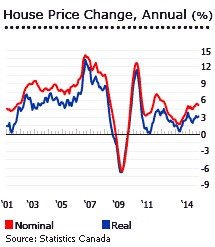
Canada's housing market is gaining momentum again. House prices in the country's eleven major cities rose by 3.47% during 2014, despite repeated market cooling measures. On a quarterly basis, house prices increased 0.75% in Q4 2014.
Biggest rises: Calgary saw the highest inflation-adjusted increase of 6.82% in 2014, followed by Hamilton (6.31%), Toronto (5.73%), and Edmonton (4.33%). Canadian cities with modest house price rises include Vancouver (3.49%), Edmonton (3.01%) and Victoria (1.73%).
Biggest falls: Halifax recorded the biggest price drop of 3.85% in 2014 from a year earlier, followed by Quebec (-2.21%), Ottawa (-1.27%), and Montreal (-1.09%).
Actual sales activity was down by 2% in January 2015 from a year earlier, according to the Canadian Real Estate Association (CREA). There were about 6.5 months of inventory nationally in January 2015, its highest level since April 2013.
The Bank of Canada has kept its key interest rate at 0.75% in February 2015, after a surprise 25-basis points cut in January 2015 in response to plunging oil prices. The key rate had been at 1% since September 2010.
Canada's economy grew by 2.4% in Q4 2014, slower than the 3.2% growth in the previous quarter. "The Bank of Canada expects growth to pick up in the second half of this year but, if the mining downturn is compounded by a housing slowdown, then we fear that may not happen," said Paul Ashworth of Capital Economics. Canada's economy is expected to be dragged down by the energy provinces, notably Alberta, the heart of the oil patch.
Dubai's housing market slowing sharply; Israel's house price rises accelerate
After maintaining the top spot in our global house price survey for seven consecutive quarters, Dubai's residential price increases decelerated to 12.98% during 2014, down from annual rises of 21.52% in 2013 and 21.64% in 2012. House prices actually fell 1.14% during the latest quarter.
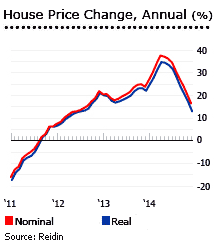
Dubai's property market has been one of the world's most volatile. Dubai saw one of the world's worst housing crashes with house prices plunging by 53% from Q3 2008 to Q3 2011. The housing market started to recover in Q2 2012 with double-digit house price increases since then.
Demand is now falling. During 2014, property transactions, both in number and value, plunged by 23% and 17%, respectively. More than 20,000 new residential units are due to enter the market this year. "Dubai residential demand is teetering," said real estate consultancy Phidar Advisory. "Price decline is gradually accelerating."
Due to falling oil prices, UAE's economy is projected to expand by a lower 3.5% this year, after GDP growth of 4.5% in 2014, 5.2% in 2013, 4.7% in 2012 and 4.9% in 2011, according to the IMF. On the other hand, Dubai, which has a more diversified and less oil dependent economy, is expected to grow by 4.5% this year.
Israel's house price rises are now accelerating. The nationwide average price of owner-occupied dwellings surged 8.65% during 2014, its biggest y-o-y increase since 2010. House prices increased 2.11% q-o-q in Q4 2014.
Yet property demand continues to fall. New dwellings sales dropped 11.1% in 2014, according to the Central Bureau of Statistics (CBS), while new dwelling supply rose by 14.1%. The oversupply is likely to be temporary, as dwelling starts and completions are now declining.
Israel's economy grew by about 2.5% last year, its slowest pace in five years, mainly due to the July-August conflict with Palestinian militants in Gaza, according to the Bank of Israel. The economy is projected to grow by 3.2% this year. The Bank of Israel kept its benchmark interest rate at a record low of 0.25% in November 2014, after cutting it in August amid the Gaza conflict.
Pacific's housing markets remain strong, but price rises slowing
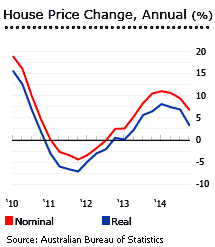
Australia's housing market is now slowing. House prices in the country's eight major cities rose by 5.25% in 2014, down from 7.42% in 2013. House prices increased 1.76% q-o-q in Q4 2014.
The Reserve Bank of Australia (RBA) kept its cash rate at a record low of 2.25% in its March 2015 meeting, after cutting it 25 basis points the previous month. "Further easing of policy may be appropriate over the period ahead, in order to foster sustainable growth in demand and inflation consistent with the target," RBA Governor Glenn Stevens said.
After a strong house price rises in recent months, "the bank is working with other regulators to assess and contain risks that may arise from the housing market," Stevens added.
Residential construction remains strong. In 2014, the total number of dwelling units approved (seasonally-adjusted) was up by 5.1% from a year earlier and by more than 30% from 2012, according to the Australian Bureau of Statistics (ABS).
Australia's economy is expected to post growth of 2.9% this year, after GDP growth of 2.8% in 2014, 2.3% in 2013, 3.6% in 2012, and 2.6% in 2011, according to the IMF.
New Zealand's housing market recorded a sharp slowdown in 2014, with the nationwide median house prices rising by 4.6% during 2014, down from the 8.02% increase in 2013. However, house prices actually rose by 7.34% q-o-q during Q4 2014.
The Reserve Bank of New Zealand (RBNZ) has introduced restrictions on high loan-to-value loans, but kept its official cash rate (OCR) at 3.5% in January, after raising it four times last year.
Property demand is slowing. Total dwellings sold were up 2.6% y-o-y in January 2015, the lowest in the past eleven months, according to the Real Estate Institute of New Zealand (REINZ). Dwelling consents increased by 3.6% y-o-y in January 2015, according to Statistics New Zealand, but their value fell 0.9%.
New Zealand's economy expanded by 3.6% in 2014, its strongest performance since 2007, according to the International Monetary Fund (IMF), after modest GDP growth of 2.8% in 2013, 2.5% in 2012 and 1.9% in 2011. The economy is projected to grow by a modest 2.8% in 2015.
Brazil's housing market grinds to a halt
During 2014, Sao Paulo's house prices rose by 0.83%, down from annual price increases of 7.59% in 2013, 9.38% in 2012, 19.18% in 2011, 17.11% in 2010 and 16.56% in 2009. Quarter-on-quarter, house prices dropped 0.8% during the latest quarter.
Brazil's economy grew by a meagre 0.15% last year. The country's economic growth is expected to be "almost flat" this year, amid tax increases and spending cuts, according to Finance Minister Joaquim Levy. Barclays Capital projects an economic contraction of 1.1% this year.
House prices in Sao Paulo soared by 113% (inflation-adjusted) from 2007 to 2013, while Rio De Janeiro's rose by 144%, after interest cuts from 26% in 2003 to 7.25% in 2012.
However starting in the first half 2013, the central bank raised the benchmark interest rate nine times to 11% in April 2014. This resulted in a sharp economic slowdown. After holding the key interest rate steady for almost seven months, the central bank decided to raise it again by 25 basis points in October 2014, and by 50 basis points in December 2014 and January 2015. In March 2015, the central bank raised the key rate again by 50 basis points to 12.75%, the highest level in almost six years.
South Africa's housing market growing modestly
South Africa's price index for medium-sized apartments rose by 2.62% during 2014, a sharp improvement from an annual decline of 1.3% in 2013. House prices increased 1.95% q-o-q in Q4 2014.
House prices in South Africa declined by 15.5% during the global financial crisis from Q4 2007 to Q2 2009. After a short-lived recovery in 2010, the housing market struggled again, with house prices falling by 1.3% from Q1 2011 to Q4 2013.
The South African economy grew by 1.4% in 2014, after real GDP growth rates of 1.9% in 2013, 2.5% in 2012, and 3.6% in 2011, according to the IMF. The South African Reserve Bank (SARB), the country's central bank, forecasts growth of 2.2% in 2015.
SARB left its benchmark repurchase rate unchanged at 5.75% in March 2015, as inflationary pressures eased and growth prospects remain weak.